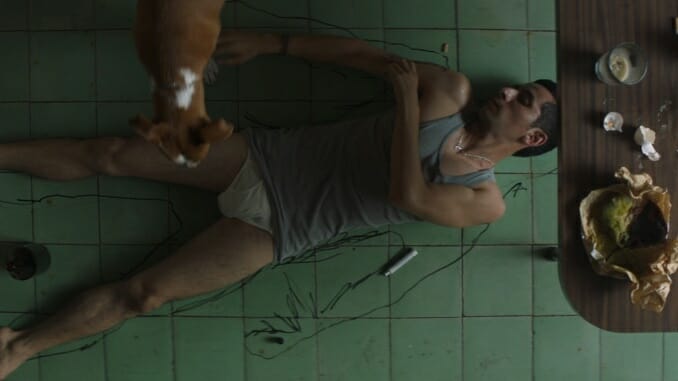A Cop Movie Creatively Confronts Mexico’s Corrupt Police Force

Out of the many striking shots captured in the docu-fiction hybrid A Cop Movie, one conveys the essence of director Alonso Ruizpalacios’ examination of Mexico’s police force unlike any other. After tying her wrist to a long, flimsy piece of rope, police academy trainee Teresa prepares to jump off of a 30-foot diving platform and into a swimming pool. It is the last challenge she must overcome in order to graduate—that of “decisiveness”—but poses an enormous threat to her life as she cannot swim, her likely fate of drowning callously counteracted by keeping her wrist tethered to land. Despite her visible fear, she takes a deep, ragged inhale and gracefully steps off the ledge. She falls in slow, straight motion toward the water—her feet pointed and arms straight at her side as she inches toward impact. Her elegance evokes the famed silhouettes of Alcapulco’s cliff divers, who fling themselves off of 135-foot peaks and into the shallows of rocky inlets below. Truthfully, there appear to be certain similarities between the two professions: Both are jobs that have an overwhelming generational pull (all cliff divers are descendents of former ones, many Mexican cops follow in the footsteps of a close relative in the force) and, most importantly, both are entrenched in the act of performance. The cliff divers have been commercialized and can only be seen (mostly by tourists) during regular performances at La Quebrada hotel, while the police in Mexico poorly perform the public role of selfless civil servant.
Interestingly, Teresa turns out to be less of a documentary subject and more of an avatar for Ruizpalacios to survey the civilian perspective of the country’s police force. Presented as the honest central subject for nearly half of the film, Teresa (who is based on a real person) turns out to be played by actress Monica del Carmen, who has expertly molded herself in the real-life officer’s image, reenacting memories from her days as an academy student to her most recent workplace woes patrolling the streets of Mexico City. At her side is fellow actor Raúl Briones, who portrays Montoya (also a real guy), the second half of the duo dubbed “the love patrol” by other cops due to their flirtatious relationship as partners. Though initially presenting themselves as two officers simply doing their best within a crumbling system, the second half of the film makes it clear that these sentiments are only the biased projections of their real-life counterparts. Through carefully crafting this illusion and then stealthily unveiling the hypocrisy behind it, A Cop Movie is subtle yet audacious in its indictment of police corruption and the individual officers who buy into it—their good intentions be damned.
While certainly incorporating elements of documentary—talking head interviews, b-roll footage and voiceover—A Cop Movie’s scope is larger than mere information-peddling. However, a rudimentary knowledge of Mexico’s long-standing utilization of police forces as violent civilian suppressors is crucial when understanding the populace’s massive distrust of the institution. Perhaps the most infamous example is the 1968 massacre of hundreds of peaceful student protesters at the hands of military and police forces in Mexico City days before the Olympics were set to be hosted in the metropolis. (They ultimately were, with little national attention given to the state-sanctioned atrocity.) More recently, there was the 2014 disappearance of 43 male students in Iguala, who ironically were commandeering buses in order to attend a protest commemorating the ’68 massacre in the capital. Of the eventual 80 individuals arrested in connection to their undeniable murder (most likely connected to the cartel), 44 have been local Guerrero police officers, including Iguala police chief Felipe Flores Velásquez. Neither of these instances are directly addressed in the film—nor any of the countless instances of police violence which surely occur on a daily basis—a fact that feels sour when considering the film’s reach as an ostensible documentary. After all, what good is exposing an institutional failing if no concrete examples are being illuminated as a result? Outside of exposing relatively tame practices of extorting local businesses and regular citizens, A Cop Movie doesn’t care to point fingers.
Though the lack of these details might at first appear misguided, the decision to stray from overt political condemnation in this sphere on Ruizpalacios’ part is not without merit. Mexico holds tightly to its title as one of the most perilous countries for working journalists, with nine having been murdered this year alone. The director’s relative silence concerning these specific events is itself a commentary on the ramshackle state of civilian protections in the country, with even less safety guaranteed for those keeping tabs on Mexico’s most powerful people, institutions and economic forces. Instead, the film’s clever conceit rests in the nuance of the actors’ individual processes in assimilating into the careers of the people they’re portraying.
-

-

-

-

-

-

-

-

-

-

-

-

-

-

-

-

-

-

-

-

-

-

-

-

-

-

-

-

-

-

-

-

-

-

-

-

-

-

-

-








































